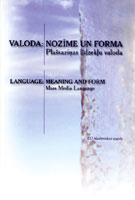Profesiju nosaukumu īpatnības darba sludinājumos
Peculiarities of Profession Names in Job Advertisements
Author(s): Iveta PūteleSubject(s): Language and Literature Studies, Gender Studies, Theoretical Linguistics, Syntax, Lexis, Marketing / Advertising
Published by: Latvijas Universitātes Akadēmiskais apgāds
Keywords: occupation name; job ad; gender; number; fold; syntax special features;
Summary/Abstract: The article deals with peculiarities of profession names as used in a language genre – job advertisements. Profession names usually are feminine and masculine pairs of one stem nouns, derived according to the morphological peculiarities of the particular gender. Listing profession names in general – in corporate documentation, profession lists, legislative acts, profession classification, etc – the masculine form is generally used, whereas mentioning the profession or position of a particular person, the profession name is used in the corresponding gender. There is a specific group that consists of profession names lacking a corresponding counterpart formed from the same stem, the lexical meaning of which already determines the gender, for instance kuģapuika ‘cabin boy’, medicīnas māsa ‘nurse’, vecmāte ‘midwife’. Recently a trend has appeared in job adverts to indicate both genders, for instance pārdevējs/-a (salesman/saleswoman), menedžeris/-e (manager), apdrošināšanas konsultants/-e (insurance broker). If the position is more commonly taken by women, the feminine form may be listed first, for instance biroja administratore/-s (office administrator), Konsulārās nodaļas sekretāre/-s (secretary of the Consular Department). The basic form of profession names to be used in different lists is nominative singular. When used in a job advert, the profession name becomes part of the text and therefore is used in some other case, mostly accusative, seldom genitive, and sometimes dative case. Hyphenated compounds are considered alien and inappropriate structures in the Latvian language, yet they are occasionally used. Their frequency of use is rather high in job advertisements. In some cases of job advertisements, profession names are expressed by wider syntactic structures. Job adverts also display deviation from the standard of the Latvian language, the suggested or officially approved usage. Job adverts also feature new, recently introduced profession names.
Journal: Valoda: nozīme un forma
- Issue Year: 2009
- Issue No: 1
- Page Range: 98-107
- Page Count: 10
- Language: Latvian

